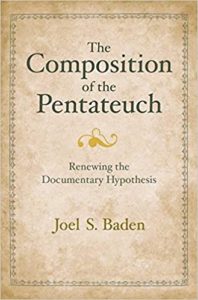Um professor de Antigo Testamento da Yale Divinity School, USA, Joel S. Baden, acaba de publicar um livro sobre o Pentateuco com um título que chama a atenção: A composição do Pentateuco: renovando a hipótese documentária.
BADEN, J. S. The Composition of the Pentateuch: Renewing the Documentary Hypothesis. New Haven: Yale University Press, 2012, 392 p. – ISBN 9780300152630
Em artigo na revista online The Bible and Interpretation – The Re-Emergence of Source Criticism: The Neo-Documentary Hypothesis – ele argumenta que a Hipótese Documentária, abandonada por boa parte da pesquisa nos últimos 40 anos, está ressurgindo em nova e mais fundamentada forma. Ela está novamente ocupando o seu lugar como uma importante teoria sobre a composição do Pentateuco.
Documentária, abandonada por boa parte da pesquisa nos últimos 40 anos, está ressurgindo em nova e mais fundamentada forma. Ela está novamente ocupando o seu lugar como uma importante teoria sobre a composição do Pentateuco.
Entretanto, lendo o artigo, fiquei decepcionado. O que começo a notar é que a proposta hipótese neodocumentária “foge da briga” para manter viva a hipótese documentária. Por um lado, várias perguntas fundamentais da hipótese documentária são consideradas inúteis e ultrapassadas. Isto aparece nos sete argumentos colocados pelo autor. E, por outro lado, termino a leitura sem saber muito bem o que propõe a “hipótese neodocumentária”. Só se isto estiver claro no livro. Quem sabe?
Ao ler o artigo de Joel S. Baden, não deixe de conferir os comentários de Niels Peter Lemche, Philip Davies, Matt Lynch, Martin Shields.
Trechos do artigo que chamaram minha atenção? Por exemplo:
:: In short, the Documentary Hypothesis is regaining its place as a viable, productive, and current approach to the Pentateuch.
:: This is not to say, however, that the Documentary Hypothesis of the early twentieth century is simply being restated. On the contrary: one of the main contributions of more recent source-critical work has been the identification and correction of the methodological problems that plagued earlier scholarship—the very problems which, it is fair to say, contributed significantly if not primarily to the move away from the Documentary Hypothesis in Europe in recent generations. Two of these methodological problems are worthy of particular attention: the question of stylistic differences as a means of distinguishing among the sources, and the question of similarity of content among the various sources.
:: Thus the very correct criticisms of anti-documentary scholars from the earliest days of the theory until our own time are not necessarily grounds for dismissing the whole hypothesis; they are, rather, a call to refine and revise the methods employed by scholars when describing and applying the hypothesis. When such refinements and revisions are undertaken, as they have been recently, the Documentary Hypothesis regains its place as the most economical, comprehensive explanation for the literary phenomena of the canonical Pentateuch.
:: David Wright has termed the recent source-critical approach the “Neo-Documentary Hypothesis,” a label which is gaining some use among its adherents and others. What, then, is the shape of the Neo-Documentary Hypothesis? How does it differ from its earlier incarnation; how does it take into account the methodological problems of classical documentary scholarship; how does it help us to better understand the composition of the Pentateuch?
:: Why the Pentateuch is incoherent: that is the driving question of all critical enquiries into the composition of the text, and the Neo-Documentary Hypothesis is the most comprehensive and economical answer to that question.
